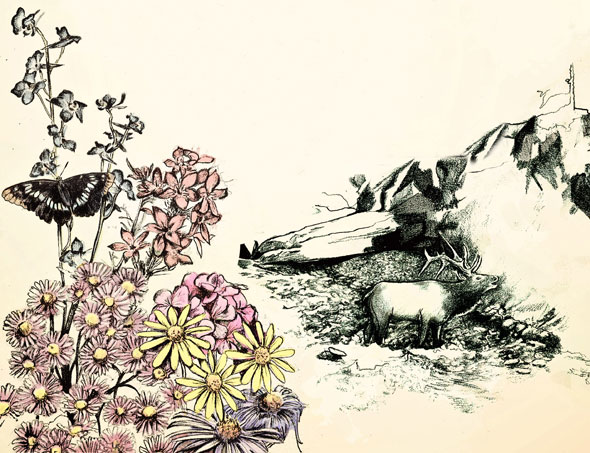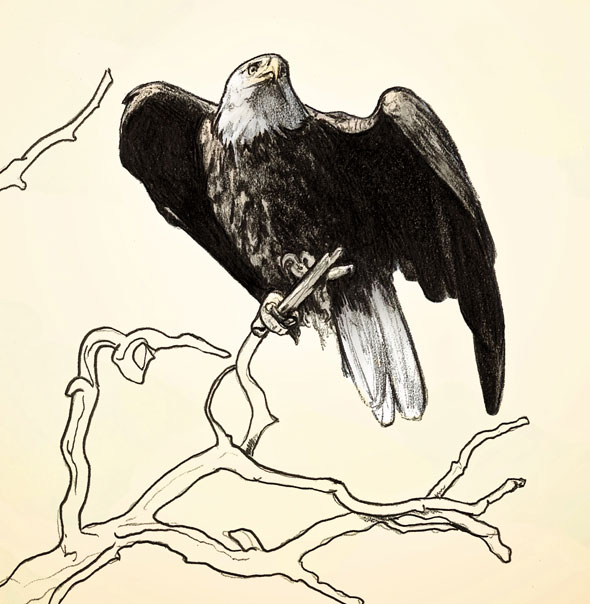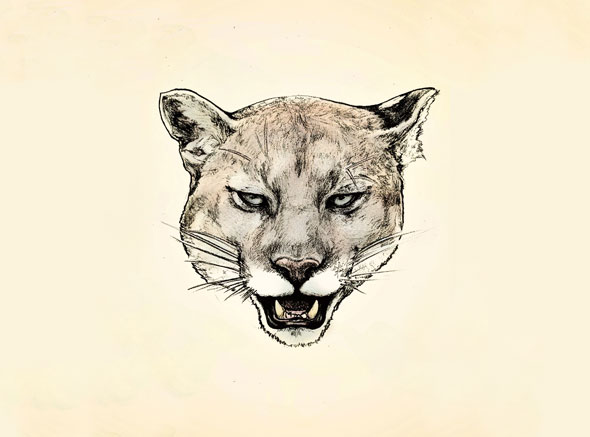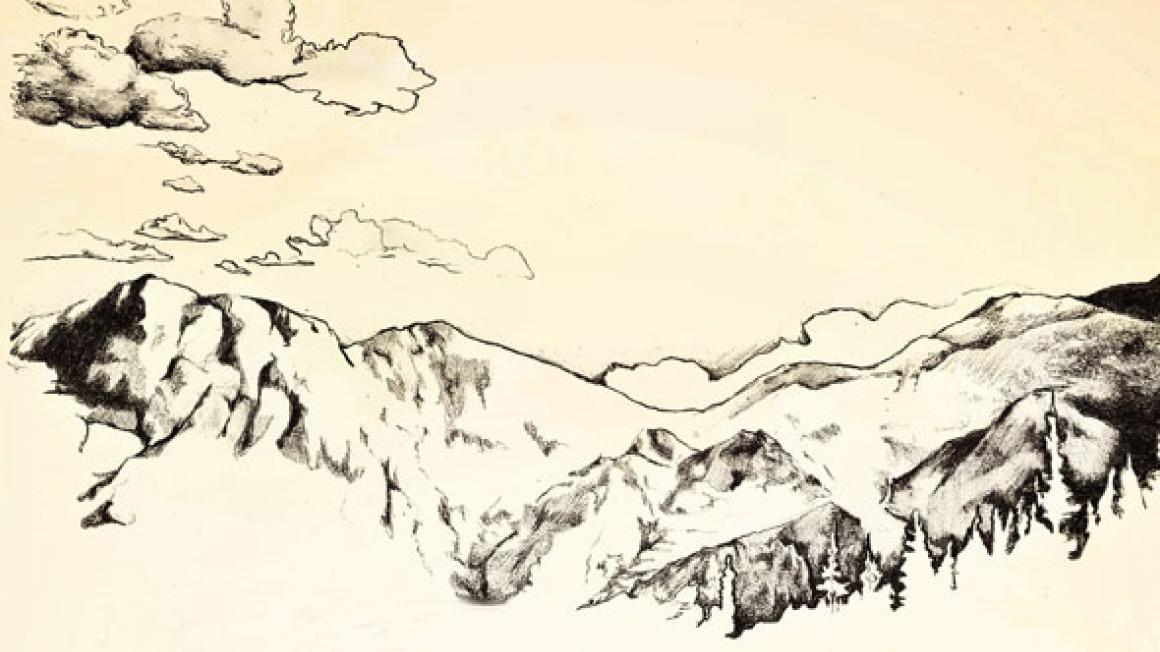Catamount
It sounded perfect – a holiday in the beautiful wilderness of the Rocky Mountains. But then Nora discovers that this is one landscape that cannot be tamed...
The sky was the biggest she had ever seen. They said the skies of Suffolk were big and the skies of Holland, but those were small, cosy, by comparison. It might belong on another planet, covering another world. Mostly a pale soft azure or a dark hard blue, it was sometimes overcast with huge rolling cumulus, swollen and edged with sharp white light, from which rain roared without warning.
Chuck and Carrie’s house was only the second built up there, under that sky. The other was what they called a modular home and Nora called a prefab, a frame bungalow standing on a bluff between the dirt road and the ridge. The Johanssons who lived there kept a few cows and fattened white turkeys for Thanksgiving. It was – thank God, said Carrie – invisible from her handsome log house, built of yellow Montana pine. She and Chuck called it Elk Valley Ranch, a name Nora had thought pretentious when she read it on their headed notepaper but not when she saw it. The purpose of the letter was to ask her and Gordon to stay and she could hardly believe it, it seemed too glorious, the idea of a holiday in the Rocky Mountains, though she and Carrie had been best friends for years. That was before she married a captain in the US Air Force stationed at Bentwaters and went back home to Colorado with him.
It was August when they went the first time. The little plane from Denver took them to the airport at Hogan and Carrie met them in the Land Cruiser. The road ran straight and long, parallel with the Crystal River that was also straight, like a canal, with willows and cottonwood trees along its banks. Beyond the flat flowery fields the mountains rose, clothed in pine and scrub oak and aspen, mountains that were dark, almost black, but with green sunlit meadows bright between the trees. The sun shone and it was hot but the sky looked like a winter sky in England, the blue very pale and the clouds stretched across it like torn strips of chiffon.
There were a few small houses, many large barns and stables. Horses were in the fields, one chestnut mare with a new-born foal. Carrie turned in towards the western mountains and through a gateway with Elk Valley Ranch carved on a board. It was still a long way to the house. The road wound through curves and hairpin bends and as they went higher the mountain slopes and the green canyons opened out below them, mountain upon mountain and valley upon valley, a herd of deer in one deep hollow, a golden eagle perched on a spar. By the roadside grew yellow asters and blue Michaelmas daisies, wild delphiniums, pale pink geraniums and the bright red Indian paintbrush, and above the flowers brown and yellow butterflies hovered.
‘There are snakes,’ Carrie said. ‘Rattlesnakes. You have to be a bit careful. One of them was on the road last night. We stopped to look at it and it lashed against our tyres.’
‘I’d like to see a porcupine.’ Gordon had his Rocky Mountains wildlife book with him, open on his knees. ‘But I’d settle for a raccoon.’
‘You’ll very likely see both,’ Carrie said. ‘Look, there’s the house.’
It stood on the crown of a wooded hill, its log walls a dark gamboge, its roof green. A sheepdog came down to the five-barred gate when it saw the Land Cruiser.
You must have spectacular views,’ Gordon said.
‘We do. If you wake up early enough you see fabulous things from your window. Last week I saw the cougar.’
‘What’s a cougar?’
‘Mountain lion. I’ll just get out and open the gate.’

It wasn’t until she was home again in England that Nora had looked up the cougar in a Mammals of North America book. That night and for the rest of the fortnight she had forgotten it. There were so many things to do and see. Walking and climbing in the mountains, fishing in the Crystal River, picking a single specimen of each flower and pressing it in the book she bought for the purpose, photographing hawks and eagles, watching the chipmunks run along the fences. Driving down to the little town of Hogan, where on their way to Telluride, Butch Cassidy and Sundance had stopped to rob the bank, visiting the hotel where the Clanton Gang had left bullets from their handguns in the bathroom wall, shopping, sitting in the hot springs and swimming in the cold pool. Eating in Hogan’s restaurant where elk steaks and rattlesnake burgers were specialities, and drinking in the Last Frontier Bar.
Carrie and Chuck said to come back next year or come in the winter when the skiing began. That was at the time when Hogan Springs was emerging as a ski resort. Or come in the spring when the snows melted and the alpine meadows burst into bloom, miraculous with gentians and avalanche lilies. And they did go again, but in late summer, a little later than in the previous year. The aspen leaves were yellowing, the scrub oak turning bronze.
‘We shall have snow in a month,’ Carrie said.
A black bear had come with her cubs and eaten Lily Johansson’s turkeys. ‘Like a fox at home,’ Gordon said. They went up to the top of Mount Opie in the new ski lift and walked down. It was five miles through fields of blue flax and orange gaillardias. The golden ridge and the pinecovered slopes looked serene in the early autumn sunshine, the skies were clear until late afternoon when the clouds gathered and the rain came. The rain was torrential for ten minutes and then it was hot and sunny again, the grass and wild flowers steaming. A herd of elk came close up to the house and one of them pressed its huge head and stubby horns against the window. They saw the black bear and her cubs through Chuck’s binoculars, loping along down in the green canyon.
‘One day I’ll see the cougar,’ Nora said and Gordon asked if cougars were an endangered species.
‘I wouldn’t think so. There are supposed to be mountain lions in every state of the United States, but I guess most of them are here. You ought to talk to Lily Johansson, she’s often seen them.’
‘There was a boy got killed by one last fall,’ Carrie said. ‘He was cycling and the thing came out of the woods, pulledhim off his bike and well – ate him, I suppose. Or started to eat him. It was scared off. They’re protected, so there was nothing to be done.’
Cougar stories abounded. Everyone had one. Some of them sounded like urban – rural, rather – myths. There was the one about the woman out walking with her little boy in Winter Park and who came face to face with a cougar on the mountain. She put the child on her shoulders and told him to hold up his arms so that, combined, they made a creature eight feet tall, which was enough to frighten the animal off. The boy in the harness shop in Hogan had one about the man out with his dog. To save himself he had to let the cougar kill and eat his dog while he got away. In the town Nora bought a reproduction of Audubon’s drawing of a cougar, graceful, powerful, tawny, with a cat’s mysterious closed-in face.
‘I thought they were small, like a lynx,’ Gordon said.
‘They’re the size of an African lion – well, lioness. That’s what they look like, a lioness.’
‘I shall frame my picture,’ Nora said, ‘and one day I’ll see the real thing.’
They came back to Hogan year after year. More houses were built but not enough to spoil the place. Once they came in winter but, at their age, it was too late to learn to ski. Seventeen feet of snow fell. The snow plough came out on to the roads on Christmas Eve and cleared a passage for cars, making ramparts of snow where the flowers had been. Nora wondered about the animals. What did they live on, these creatures? The deer ate the bark of trees. Chuck put cattle feed out for them and hay.
‘The herds have been reduced enough by mountain lions,’ he said. ‘You once asked if they were endangered. There are tens of thousands of them now, more than there have ever been.’
Nora worried about the golden eagle. What could it find to feed on in this white world? The bears were hibernating. Were the cougars also? No one seemed to know. She would never come again in winter when everything was covered, sleeping, waiting, buried. It was one thing for the skiers, another for a woman, elderly now, afraid to go out lest she slip on the ice. The few small children they saw had coloured balloons tied to them on long strings so that their parents could see and rescue them if they sank too deep down in the snow. All Christmas Day sun blazed, melting the snow on the roof, and by night frost held the place in its grip, so that the guttering round the house grew a fringe of icicles.
The following spring Gordon died. Lily Johansson wrote a letter of sympathy and when Jim Johansson died next Christmas Nora wrote one to her. She delayed going back to the mountains for a year, two years. Driving from the airport with Carrie, she noticed for the first time something strange. It was a beautiful landscape but not a comfortable one, not easeful, not conducive to peace and tranquillity. There was no lushness and, even in the heat, no warmth. Lying in bed at night or sitting in a chair at dawn, watching for elk or the cougar, she tried to discover what was not so much wrong, it was far from wrong, but what made this feeling. The answer came to her uncompromisingly. It was fear. The countryside was full of fear, and the fear, while it added to the grandeur and in a strange way to the beauty, denied peace to the observer. Danger informed it, it threatened while it smiled. Always something lay in wait for you round the corner, though it might be only a beautiful butterfly. It never slept, it never rested even under snow. It was alive.
Lily Johansson came round for coffee. She was a large heavy woman with calloused hands who had had a hard life. Six children had been born to her, two husbands had died. She was alone, struggling to make a living from hiring out horses, from a dozen cows and turkeys. Every morning she got up at dawn, not because she had so much to do but because she couldn’t sleep after dawn. The cougar, passing the night high up in the mountains, came down many mornings past Lily’s fence to hunt along the green valley. It might be days before she came back to her mountain hideout but she would come back, and next morning lope down the rocky path between the asters and the Indian paintbrush past Lily’s fence.

‘Why do you call it “she”?’ Nora asked. Was this an unlikely statement of feminist principles?
Lily smiled. ‘I guess on account of knowing she’s a mother. There was weeks went by when I never saw her, and then one morning she comes down the trail and she’s two young ones with her. Real pretty kittens they was.’
‘Do you ever speak to her?’
‘Me? I’m scared of her. She’d kill me as soon as look at me. Sometimes I says to her, “Catamount, Catamount”, but she don’t pay me no attention. You want to see her, you come down and stop over and maybe we’ll see her in the morning.’
Nora went a week later. They sat together in the evening, the two old widows, drinking Lily’s root beer, and talking of their dead husbands. Nora slept in a tiny bedroom, with linen sheets on the narrow bed and a picture on the wall of (appropriately) Daniel in the Lion’s den. At dawn Lily came in with a mug of tea and told her to get up, put on her ‘robe’ and they’d watch.
The eastern sky was black with stripes of red between the mountains. The hidden sun had coloured the snow on the peaks rosy pink. All the land lay still. Along the path where the cougar passed the flowers were still closed up for the night.
‘What makes her come?’ Nora whispered. ‘Does she see the dawn or feel it? What makes her get up from her bed and stretch and maybe wash her paws and her face and set off?’
‘Are you asking me? I don’t know. Who does? It’s a mystery.’
‘I wish we knew.’
‘Catamount, Catamount,’ said Lily. ‘Come, come, Catamount.’
But the cougar didn’t come. The sun rose, a magnificent spectacle, almost enough to bring tears to your eyes, Nora thought, all that purple and rose and orange and gold, all those miles and miles of serene blue. She had coffee and bread and blueberry jam with Lily and then she went back to Elk Valley Ranch.
‘One day I’ll see her,’ she said to herself as she stroked the sheepdog and went to let herself in by the yard door.
But would she? She had almost made up her mind not to come back next year. This was young people’s country and she was getting too old for it. It was for climbers and skiers and mountain bikers, it was for those who could withstand the cold and enjoy the heat. Sometimes when she stood in the sun, its power frightened her, it was too strong for human beings. When rain fell it was a wall of water, a cascade, a torrent, and it might drown her. Snakes lay curled up in the long grass and spiders were poisonous. If anything could betoo beautiful for human beings to bear, this was. Looking at it for long made her heart ache, filled her with strange undefined longings. At home once more in the mild and gentle English countryside, she looked at her Audubon and thought how this drawing of the cougar symbolised for her all that landscape, all that vast green and gold space, yet she had never seen it in the flesh, the bones, the sleek tawny skin.
Two years passed before she went back. It would be the last time. Chuck was ill and Elk Valley was no place for an old sick man. He and Carrie were moving to an apartment in Denver. They no longer walked in the hills or skied on the slopes or ate barbecue on the bluff behind the house. Chuck’s heart was bad and Carrie had arthritis. Nora, who had always slept soundly at Elk Valley Ranch now found that sleep eluded her, she lay awake for hours with the curtains drawn back, gazing at the black velvet starry sky and listening to the baying of the coyotes at the mountain’s foot. Sleepless, she began getting up earlier and earlier and on the second morning, tip-toeing to the kitchen, she found that Carrie got up early too. They sat together, drinking coffee, and watching the dawn.
The night of the storm she slept and awoke and slept till the thunder woke her at four. The storm was like nothing she had ever known, and she who had never been frightened by thunder and lightning was afraid now. The lightning lit the room with searchlight brilliance and while it lingered, dimming and brightening, for a moment too bright to look at, the thunder rolled and cracked as if the mountains themselves moved and split. Into the ensuing silence, the rain broke. If you were out in it, you couldn’t defend yourself against it, it would beat you to the ground.
Carrie’s calling fetched her out of her room. No lights were on. Carrie was feeling her way about in the dark.
‘What is it?’
‘Chuck’s sick,’ Carrie said. ‘I mean, very sick. He’s lying in bed on his back with his mouth all drawn down to one side and when he speaks his voice isn’t like his voice, it’s slurred, he can’t form the words.’
‘How do you phone the emergency services? I’ll do it.’
‘Nora, you can’t. I’ve tried calling them. The phone’s down. Why do you think I’ve no lights on? The power’s gone.’
‘What shall we do? I don’t suppose you want to leave him but I could do something.’
‘Not in this rain,’ Carrie said. ‘When it stops, could you take the Land Cruiser and drive into Hogan?’
Then Nora had to admit she had never learned to drive. They both went to look at Chuck. He seemed to be asleep, breathing noisily through his crooked mouth. A crash from somewhere overhead drove the women into each other’s arms, to cling together.

‘I’m going to make coffee,’ Carrie said.
They drank it, sitting near the window, watching the lightning recede, leap into the mountains. Nora said, ‘The rain’s stopping. Look at the sky.’
The black clouds were streaming apart to show the dawn. A pale tender sky, neither blue nor pink but halfway between, revealed itself as the banks of cumulus and the streaks of cirrus poured away over the mountain peak into the east. The rain lifted like a blind rolled up. One moment it was a cascade, the next it was gone, and the coming light showed gleaming pools of water and grass that glittered and sparkled.
‘Try the phone again,’ Nora said.
‘It’s dead,’ said Carrie, and realising what’s she’d said, shivered.
‘Do you think Lily’s phone would be working? I could go down there and see. If her phone’s down too, maybe she’d drive me into Hogan.’
‘Please, Nora, would you? I can’t leave him.’
The air was so fresh, it made her dizzy. It made her think how seldom most people ever breathe such air like this or know what it is, but that once the whole world’s atmosphere was like this, as pure and as clean.
The sun was rising, a red ball in a sea of pale lilac, and while on the jagged horizon black clouds still massed, the huge deep bowl of sky was scattered over with pink and golden cirrus feathers. Soon the sun would be hot and the land and air as dry as a desert.
She made her way down the hairpin bends of the mountain road, aware of how poor a walker she had become. An ache spread from her thighs into her hips, particularly on the right side, so that in order to make any progress she was forced to limp, shifting her weight on to the left. But she was near Lily Johansson’s house now. Lily’s two horses stood placidly by the gate into the field.
Then, suddenly, they wheeled round and cantered away down the meadow as if the sight of her had frightened them. She said aloud, ‘What’s wrong? What’s happened?’
As if in answer the animal came out of the flowery path on to the surface of the road. She was the size of an African lioness, so splendidly loose-limbed and in control of her long fluid body that she seemed to flow from the grass and the asters and the pink geraniums. On the road she stopped and turned her head. Nora could see her amber eyes and the faint quiver of her golden cheeks. She forgot about making herself tall, putting her hands high above her head, advancing menacingly. She was powerless, gripped by the beauty of this creature, this cougar she had longed for. And she was terribly afraid.
‘Catamount, Catamount,’ she whispered but no voice came.
The cougar dropped on to her belly, a quivering cat flexing her muscles, as she prepared to spring.
Catamount by Ruth Rendell is included in Interactions, a book of short stories published by Roast Books, £12. The collection aims to raise awareness and funds for InterAct Reading Service, a charity aimed at stimulating the minds of stroke patients.
Illustration by Robert Reed: www.thisisreed.com
LADY READERS You can buy Interactions for the special price of £10. Order online at www.roastbooks.org or send your details, plus a cheque made payable to Roast Books Ltd, to Roast Books, South Park Studios, 88 Peterborough Road, London SW6 2RT. Reference Lady Magazine.




